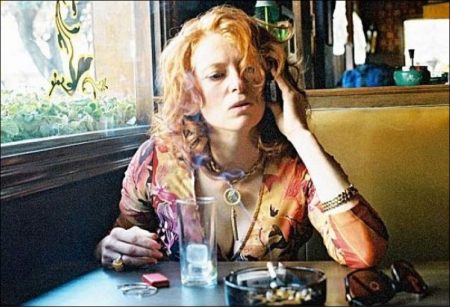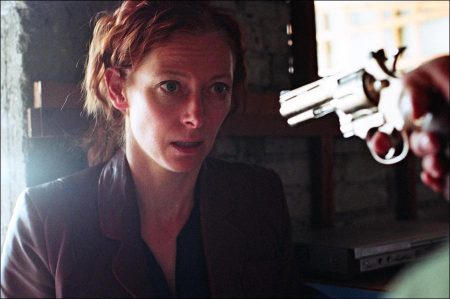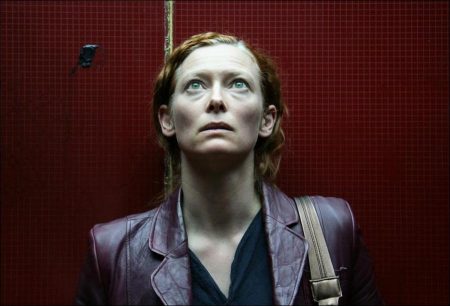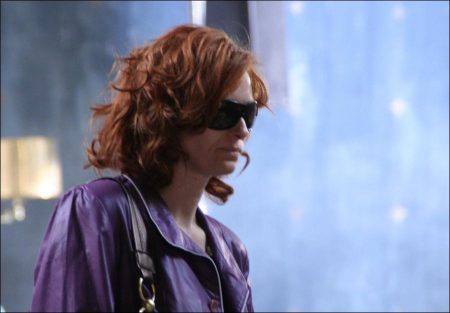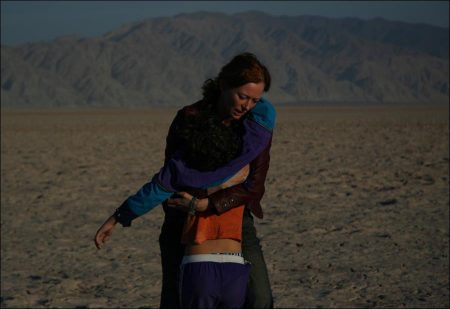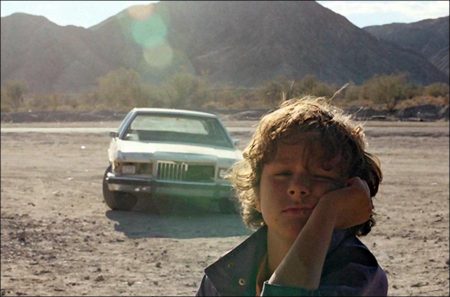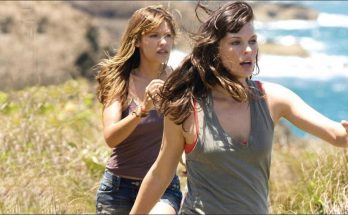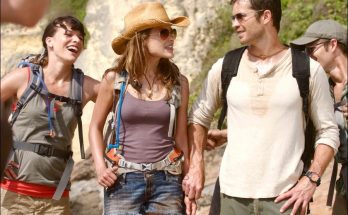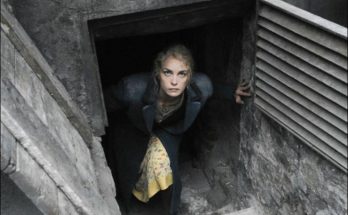Julia is an alcoholic on the constant decline. She spends the nights partying, usually not knowing where she is, when she wakes up. Because of that, she loses her job. Her only friend, Mitch, a recovering alcoholic himself, makes her go to an AA meeting, where she meets her neighbour, Elena. A few days later, Julia passes out on the sidewalk in front of her apartment building.
When she comes to, she’s in Elena’s flat. Elena starts to talk about her son Tommy, who lives with his grandfather, because his father died and Elena herself has a history of psychosis. The grandfather is very rich. Elena tells Julia that she wants to kidnap her son and go back to Mexico with him and she needs Julia to help her, she would pay her $50,000.
Julia declines at first, but after a couple of drinks and overcoming a few doubts, she tells Elena that she’ll do it. But Julia is not satisfied with the arrangement and goes to her old friend Nick, a former crook. She asks him to help her kidnap the child and ask for a ransom from his grandfather. Nick says no.
Julia then goes to an acquaintance of hers, Leon, to ask him for help. She tells him that Elena owes her $5,000 and that she would split with him if helped her. He agrees to do it. Leon gets her a gun. Elena explains the plan. The boy and his guardian will be swimming at the river in a couple of days time. Julia should wait in the car close to the place, while Elena gets Tommy and then Julia shall drive them to the border. Elena asks Julia not to drink that day.
Julia agrees to everything, getting very drunk before the whole thing. Mitch finds her and sleeps with her, telling her the whole story of how he lost his family through his alcoholism and that Julia should take care of herself and watch out. Julia leaves, not caring about what he said. Later, she discovers that Elena doesnt have any money after all.
Julia is a 2008 French crime drama film, directed by Erick Zonca, starring Tilda Swinton. It was shot in California and Mexico. The film was inspired by the John Cassavetes film Gloria. The film made its debut February 9, 2008 at the Berlin International Film Festival, and then was released for worldwide theatrical release: March 12, 2008 in France; May 7, 2008 in Belgium; June 19, 2008 in Germany; August 10, 2008 in India; August 14, 2008 in Netherlands; August 21 in Kuwait. The film had a limited theatrical release in the United States commencing April 24, 2009 and was released on DVD August 18, 2009.
Interview with Tilda Swinton
Q: How did you become Julia?
A: I heard about the film in a rumorish sort of way before there was any kind of official approach because I had met Zonca in Cannes in very frivolous circumstances and I really liked him. He is an extraordinary animal with a very rare instinct. I remember somebody saying of Rossellini that he just films the facts, and that’s what Zonca does. He just sets it up and films the facts. He’s not a witness, he wants to be inside the character’s head, and all around them and embrace them as well. I think that’s unique and I want to be a part of it.
Q: How would you describe the character?
A: There is a major relationship at the beginning of this film, between Julia and drink. In the opening bar scene, there are fifty people, all drunk, but they’re drinking because it’s Friday night and maybe only drink one Friday night in four or six. However, there is a couple in there that are dangerously alcoholic and Julia is one of them. But she doesn’t look it. You see her in theory having a great time, but really she’s there for the drink, and she’s eating onions and olives out her cocktail because it may be the only food she eats all day. As a result of her alcoholism, Julia’s addicted to lying. She doesn’t know how to tell the truth and doesn’t even know that it’s a good idea to learn. She’s got her foot on the accelerator so hard and it’s all going in the wrong direction, and the further she goes the more helpless she is.
Q: The only way for her is down?
A: When we meet her, Julia’s really in a state of terror. When Johnny kicks her out of a taxi and doesn’t even pick her up, you know that life’s getting really tough for her. One of the scenes I love, because it’s possibly one of the only moments when she tells the truth, is when she goes to see Nick, her ex-lover, and tries to persuade him to do this scam with her. Twenty years or even ten years ago, it would have worked beautifully, but now her life’s falling apart. If you’re looking for a motive for why she abducts the boy, Tom, it’s because she’s running scared.
Q: Her meeting with Tom is crucial…
A: It’s a defining moment for Julia. We see her as some kind of washed up party girl, but at that point it cranks up a gear in terms of her alienation. An alcoholic is alienated. You can’t really say Julia has a relationship with anybody. She’s chewing them up and spitting them out. The only reason she pays any attention to Elena is because she starts talking about money. With the boy, it’s different because he doesn’t behave the way she expected him to behave. She thought she was kidnapping a 4-year-old, but she gets a 9-year-old who is at least as tough, if not tougher, than her.
Q: How does she relate to him?
A: We wanted to do a fairly radical thing, to show a woman not in touch with her maternal feelings. In the cinema, that’s a rare thing to show because there’s this sort of kneejerk thing that all women have them. It’s monstrous that a woman at this stage in her life does things like holding a gun to the head of a child. On the other hand, she comes to the aid of another person and she’s just so real that you’re still rooting for her.
Q: What is the impact on Julia of their escape across the desert to Mexico?
A: I love the fact that she’s the only American I’ve ever seen on film crashing her way through a wall into Mexico. In CityplaceL.A., there is a certain claustrophobia. It’s not about buildings, but a lack of vista. And then in Tijuana, when she wakes up after her night with Diego, she looks out over that shanty town and it’s beautiful to her. There’s a texture to it. It’s more beautiful than pulling on a green paillette dress. She has escaped. And then twenty seconds later, she’s chasing after gangsters who have taken Tom.
Q: As well as crossing borders, the film crosses genres…
A: I like the randomness of suddenly finding yourself in a completely different film, a thriller, a gangster movie, a film noir. My understanding is that it’s a very alcoholic state to be in. You’ve suddenly got yourself into something way deeper than you thought you had and by the time you notice, you’re halfway down the road with a gun at your head. Formally, it’s risky, but in terms of atmosphere and territory, it’s really radical.
Q: The film doesn’t attempt to explain Julia’s addiction…
A: I think it’s really brave not to do that. Where is the scene where Julia says, “You know, Elena, I’m going to help you because you remind me of my mother.” She doesn’t work that way. She has an animal’s survival instinct. She loses the boy, but she manages to get him back. And she manages to come up with another lie at the end. Easy come, easy go. In the heart of the character and therefore in the heart of the film, is the ability to be totally random, to do things without any motive. It’s rare in a film about an addict that you don’t see her breaking down and saying, “My life’s a complete sham.”
Q: Julia’s a prizefighter, knocking down all-comers. Is that how it felt playing her?
A: I felt very much like a fighter. Erick and I agreed that it should be physically exhausting because she’s beating her body up in so many ways. There’s a sense of constantly being in a sweat, whether it’s because of having to find a way out of a crisis or create some lie or other, or whether it’s just walking around in those shoes in L.A. or Mexico, wearing clothes that are too tight. The physical battle is relentless. In performance terms, this is a first for me. I’ve always been concerned with taking facets of my own experience and blowing them up into a story. Before Julia, I’d never gone so far outside of the shapes that I personally make.
Q: What was it like shooting the movie?
A: The atmosphere on set was really feral because we were also running ahead of ourselves. We were always running scared. You didn’t have to be playing Julia to feel a light sweat on the back of your neck. We were up against it. In Mexico, although we loved it and shot with a phenomenal crew, it was hardcore shooting. It was like trench warfare, but it was very much a film made by a tight group of people. Every department was stretched.
Q: And working with Erick Zonca?
A: This film feels like the beginning of the work that I’ve been looking forward to doing really proud of it and relieved it happened because I’d been wanting it to come along and there it was. There’s something about the opportunity with this film and this filmmaker. His cinema feels like something emotional, even spiritual. Zonca’s characters are survivors. It’s all about the persistence of the human spirit. It’s incredibly optimistic. And what’s so refreshing is that it’s genuinely amoral. There is no great statement by the European artist about the state of America and its bordering nation. There are no great claims made. I find that properly modest and responsible somehow.
Julia (2009)
Directed by: Erick Zonca
tarring: Tilda Swinton, Saul Rubinek, Kate del Castillo, Aidan Gould, Jude Ciccolella, Bruno Bichir, Horacio Garcia Rojas, Mauricio Moreno, Ezra Buzzington, Eugene Byrd, Roger Cudney
Screenplay by: Michael Collins, Camille Natta
Production Design by: François-Renaud Labarthe
Cinematography by: Yorick Le Saux
Film Editing by: Philippe Kotlarski
Costume Design by: April Napier
Set Decoration by: Luis Figueroa
Art Direction by: Carlos Y. Jacques
MPAA Rating: R pervasive language, some violent content and brief nudity.
Distributed by: Magnolia Pictures
Release Date: April 24, 2009
Visits: 77
